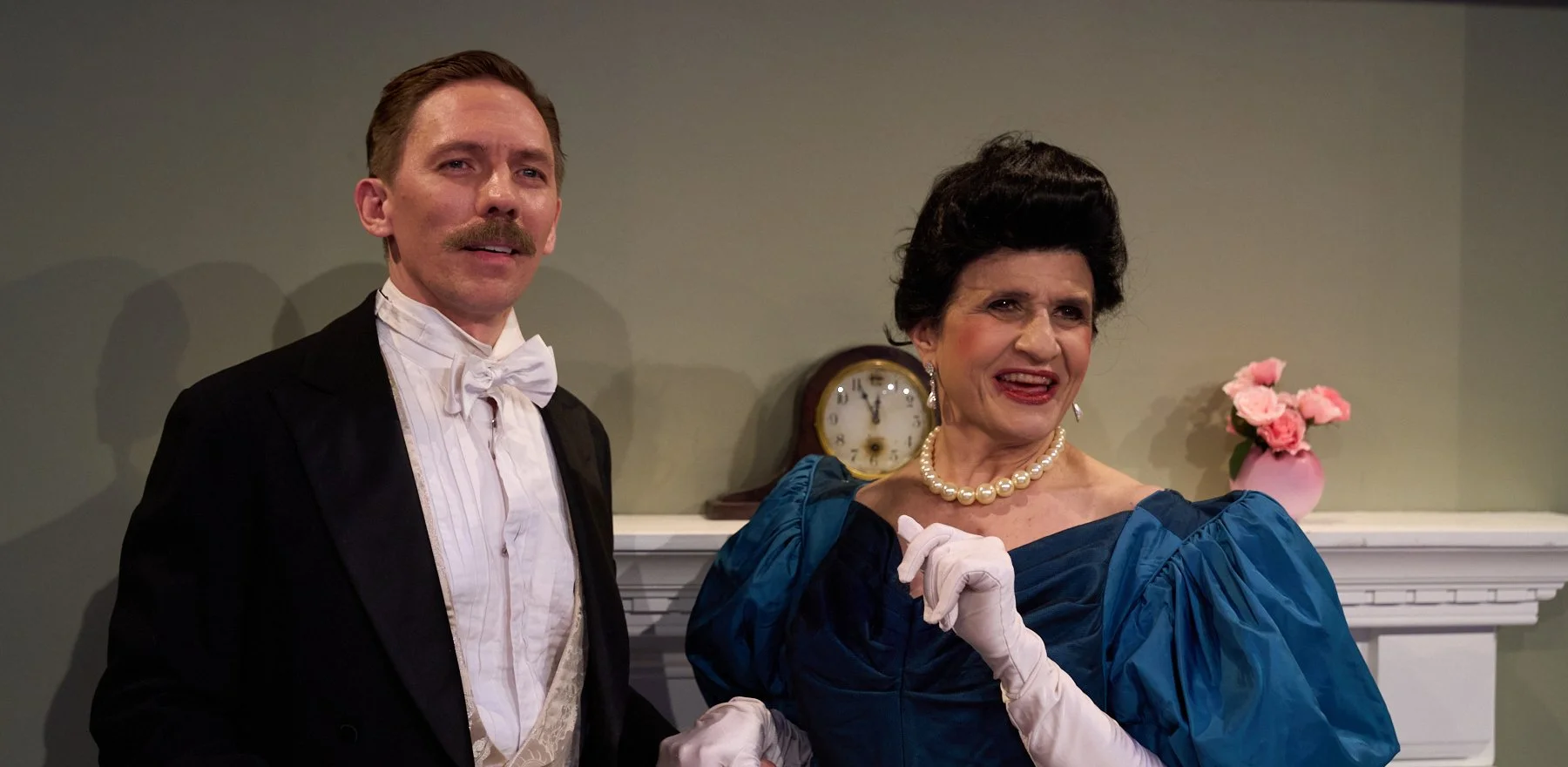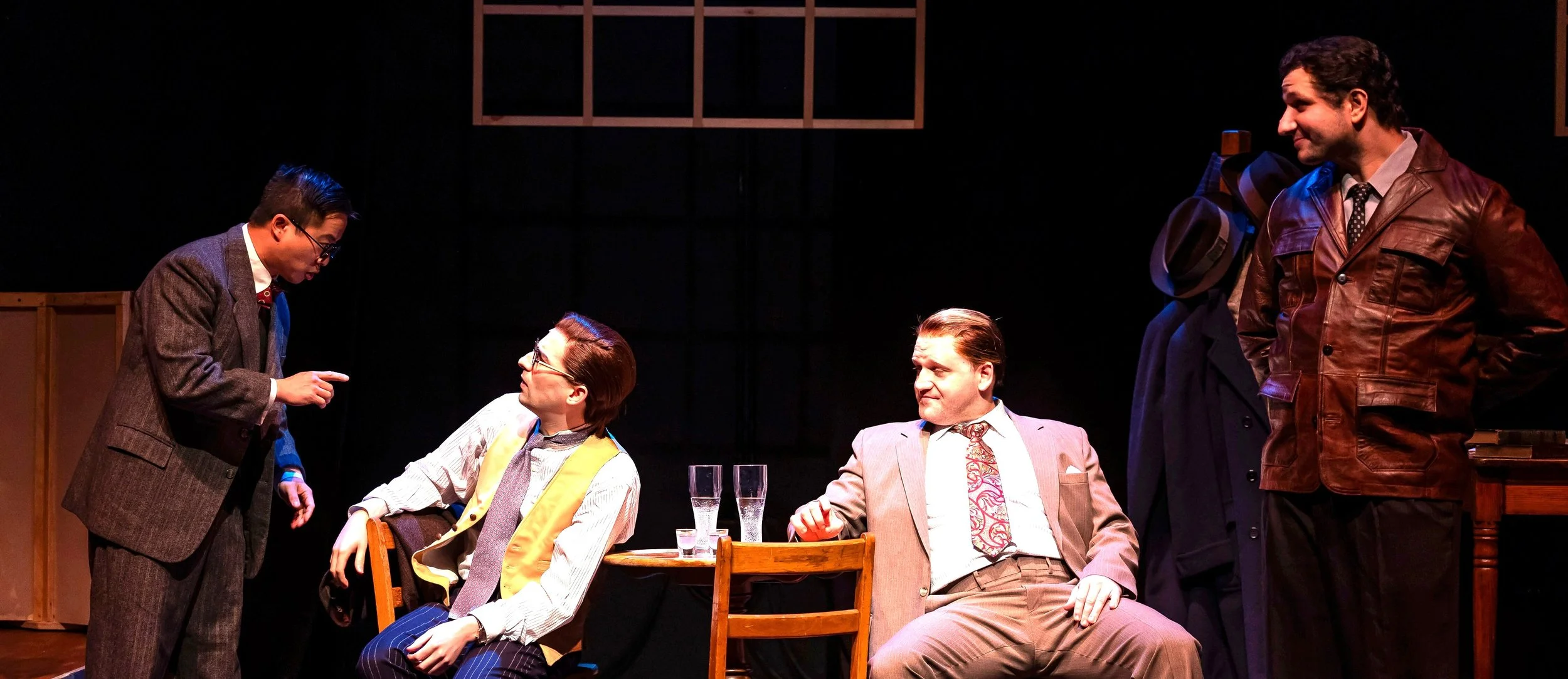Empire, a musical about the building of the Empire State Building—has a lot of heart. Set in three time periods—1929, 1930, and 1976—the story moves back and forth between Sylvie Lee (Julia Louise Hosack) and Mohawk Grandmother (April Ortiz) in the 1970s and the character of Frances Belle (Kaitlyn Davidson), a.k.a. “Wally,” a firecracker of a woman who is classy in pants, working her magic in a man’s world in the 1920s and ’30s, as the iconic skyscraper is being built.
Cheers!
The illusory brand of theatrical magic is difficult to find—especially in solo shows. Precious few one-man productions can effectively create that beautiful “baseless fabric” of a transportive play, and even then, their illusions are sometimes imperfect. A single body moves across a deserted stage with not much else but light and music and those elemental players for company. It’s easy to falter when carrying the weight of performance alone, but writer/comedian Terri Girvin, the multi-character star of director Michael Leeds' production of Last Call at the IRT Theater, bolsters an otherwise ordinary tale of a long-serving New York bartender with surprising humor and extraordinary moments of intimacy.
Pools of soft, yellowing light accompany Terri Girvin as she moves through her life story. She begins with a series of easy jokes; "Top 10 Ways to Annoy Your Bartender" is a recurring and sometimes quite delightful theme that runs through her monologues. She then proceeds to insert details of her family’s dysfunctional history in momentary, painful snapshots. These scenes are relayed with grim amusement on Girvin’s part, as it is her mother, a divorced, drink-happy ex-party clown who is the source of this dysfunction. Here, Girvin’s practiced, punch-line-delivering style gives way to the emotional drama of her relationship with her mother. Halfway through the play, the audience becomes unsure of its laughs, and seem more comfortable in silence.
But the scenes themselves are transitory. They seem more like floating motes of experiential anecdotes rather than seamless parts of an organic autobiography. Here is where Girvin’s talent for stand-up comedy interferes slightly with theatrical storytelling. The moments in which Girvin’s mother steps onto the stage in the guise of her own daughter are short; Girvin impersonates her mother uneasily, and is keen to relieve her audience’s tension with a joke. It’s easy for the audience to see that Girvin’s mother is an emotionally dependent, paranoid, unstable and completely unfit parent, but somehow her daughter doesn’t realize that this legacy is in her hands until the end. Consequently, Girvin’s mother, only heard and not seen, is never fully redeemed. For most of the production, she is a two-dimensional weight on her daughter’s shoulders. Girvin, by her own reckoning, deeply desires “freedom from the weight of her [mother’s] trauma.”
Regardless of these dips in storytelling, it is apparent that Girvin is the only person from her family who can stand her mother’s antics. She also seems, by her own telling, to be more involved in her mother’s disorganized life than her largely indifferent brothers. Girvin’s brother is especially blunt: “It’s fun when the circus comes to town, but when the circus never leaves!” A particularly hectic night at the bar sees Girvin taking close to 50 orders every 10 minutes. It is perhaps the aural and visual climax of the entire production. Girvin’s silent co-stars put on terrific performances, as evidenced by the unique collaboration between Grammy-nominated sound designer Phil Palazzolo and lighting designer Jason Fok.
With not a single prop in sight, Girvin clinks imaginary shot glasses onto the bar and pours fizzing drafts of beer into empty steins. She chats genially with the disembodied voices of her customers and slams a nonexistent cash register closed before turning to the audience and grinningly inquiring, “What can I getcha?” Every delectable sound, from the dull roar of conversation to the sloshing of a drink, matches in near-perfect synchronicity with Girvin’s expert movements. Every voice has its own extraordinarily ordinary life; Palazzolo and Fok have squeezed alchemical gold from the listless air with their superb intertwining of light and sound.
But the harmony of Girvin’s movements, in perfect beat and cadence to the swing of her bar, quickly devolves into chaos when she receives a call from her mother. Without revealing Girvin’s mother’s shocking escapade, and the proverbial last straw for Girvin herself, the harried and exhausted bartender ends up kicking everyone out of her bar. She listens shamefacedly to her customer’s insults and drunken raging (who only minutes before had flirted, smiled or laughed with her). She then slams her phone onto the bar, looking out teary-eyed and tired at her arrested audience as we wonder: Was that their last call?
It is this explosive scene that discloses the fundamental problem Girvin has with marrying the architecture of her life to that of her mother. We are never sure if she takes up the Sisyphean task of maintaining any semblance of a relationship with her mother after this. But this unmarried, diminutive, middle-aged working woman is still a hopeful, optimistic child at heart. Her ever-cheerful retort to the dull greeting, “How are you?” is a loud, “Living the dream!” The final scene is nostalgically beautiful, and we stitch up her disparate stories of love, loss and emotional pain into a safe blanket we wish we could cover her in. And in perhaps the most moving, and most fitting, end to this darkly humorous tale of a life not yet fully lived, Girvin leaves us with no ending. We only have her memories.
Last Call ran from Oct. 9-Nov. 1 at the IRT Theater (154 Christopher St., #3B) in Manhattan. For more information, visit www.terranovacollective.org.
Finding True Joy
Sex, drugs, alcohol and money does not bring contentment to New York City lawyers, but it is still entertaining to watch the lawyers search for inner peace. Ethan McSweeny directs an accomplished ensemble in Thomas Bradshaw’s Fulfillment. Set in present-day Manhattan, the play covers ridiculous housing challenges and various pathways to self-satisfaction that resonate with New Yorkers.
The play's protagonist is a 40-year-old black lawyer named Michael (Gbenga Akinnagbe), who has worked 80 hours a week for the past nine years at a law firm with the same title of senior associate. Although Michael's colleague Steven started at the law firm the same time as Michael, Steven has been promoted to partner and makes $800,000 a year. Michael’s white, office hookup-turned girlfriend Sarah (Susannah Flood) claims that Michael has not been promoted to partner because of racism. She says, “Just think about it. No women partners, no black partners. I’m telling you this because we’re two of the only people from under-represented groups working here. We need to stick together.”
Whenever Michael’s white boss Mark (Peter McCabe) has a new, black client, Mark “trot[s] [Michael] out like a show horse!” Mark claims that Michael has not been made partner because Michael has a drinking problem. Mark offers to have the firm pay for Michael to go to rehab, but Michael does not want to be away from work for that long. Michael also just bought a “shoebox in Soho” to live in for $1.5 million and had to borrow $80,000 from his mother’s retirement to help cover the down payment. Sarah says that Michael should instead “be living in a five million dollar apartment.”
This play’s message about happiness not being found in external things is communicated well. The value of this production is demonstrated in how this message is shown through the breakdown of Michael’s life. Audiences witness how Michael’s alcohol dependency feeds his insecurities and ultimately sabotages everything Michael has been trying to create for himself. New York City theatergoers will also easily relate with the intolerable amount of noise from Michael’s upstairs neighbor Ted (Jeff Biehl). The situation only escalates when Michael complains to the president of his condo association Bob (Denny Dillon).
As a grown man, Michael appears naive and boyish and easily manipulated by others. His own identity and sense of self-worth are questionable. Akinnagbe conveys Michael’s innocence eloquently and this allows for audiences to eventually develop compassion for Michael’s struggle. It also softens the cold, robotic, conniving exterior behavior of the other characters. Audiences begin to understand the roots of Michael’s alcoholism when Sarah says, “It’s only natural that you have no idea how to deal with people. You stopped maturing emotionally the second you started to drink [alcohol].” Michael started drinking when he was 16 years old.
As the characters seek fulfillment in their own lives, theatergoers may start to wonder if this production achieves what it set out to accomplish. Even with stellar performances like McCabe perfectly nailing his portrayal of Michael’s boss, the production seems like it is still in its adolescent stages. The material is fresh, quick and current but feels underdeveloped. The scenes tend to be short and end too prematurely for audience members to get the full emotional impact. The creative transitions between the scenes are flawless due to the lighting by Brian Sidney Bembridge and sound by Mikhail Fiksel and Miles Polaski. However, the multiple transitions become disruptive and lose their originality after a while. At times, the production relies on engaging audiences by using intense sexual scenes with masturbation, S&M and full-frontal nudity. Sex choreographer Yehuda Duenyas creates very realistic sexual scenes and it is like sitting on the set of a pornographic film.
Fulfillment does capture modern life in New York City and creates a greater conversation around what motivates and drives people. At the same time, Bradshaw could have focused more on universal, redeeming qualities. This would add depth to the production’s message and allow for audiences to empathize with the characters’ vulnerabilities. McSweeny could also achieve this through directing the actors to have more emotional range in their performances.
The overall aim of this production falls short, and the production’s message has so much potential to mature and could even be further developed. Despite these weaknesses, the cast is superb and well worth seeing in this production. The Flea Theater has produced award-winning Off-Off-Broadway productions and is known for showcasing current and original material. For those seeking a captivating glimpse into the life of an alcoholic lawyer in New York City who has not come to terms with his alcoholism, then see Fulfillment.
Thomas Bradshaw's Fulfillment runs until Oct. 19 at The Flea Theater (41 White St. between Church St. and Broadway) in Manhattan. Evening performances are Wednesday–Monday at 7 p.m. and matinee performances are Sunday at 3 p.m. Tickets are $35, $55, $75 and $105 and can be purchased by calling 212-352-3101 or visiting www.theflea.org.











